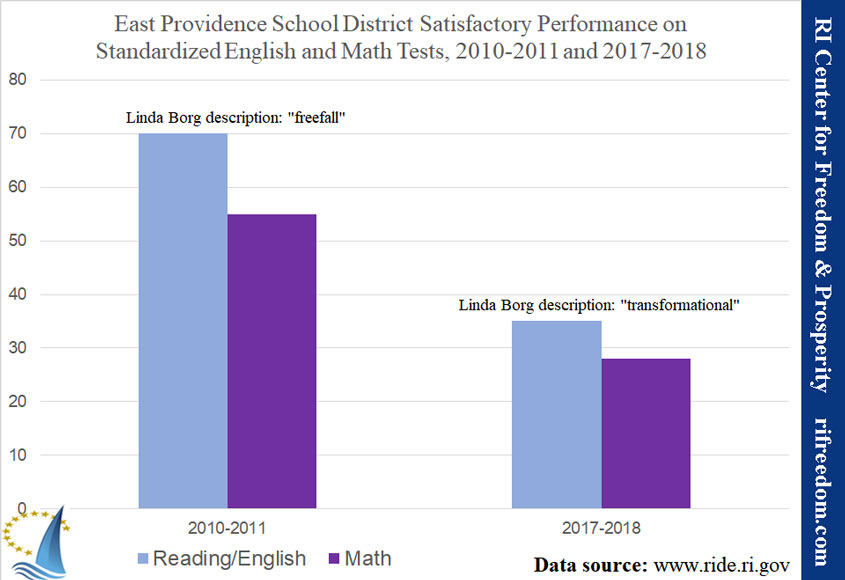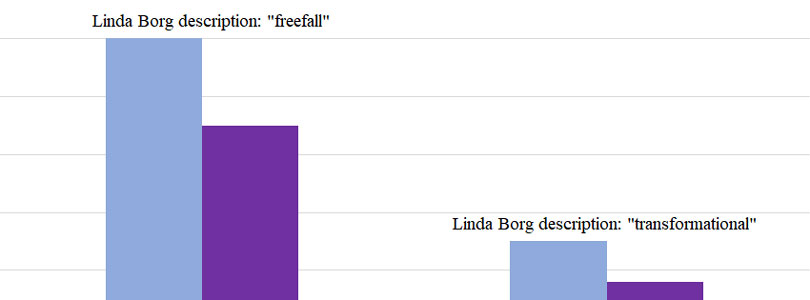The Longing for Good News in Education, East Providence
A cheerleading article by Linda Borg back in September deserves to be memorialized with commentary so that it may be remembered in years to come:
“Townie Pride” is back.
Educators in the city are crediting the schools superintendent, along with a new School Committee and a big boost in state funding, for engendering nothing short of a transformation of the district’s schools. …
In 2010, residents voted in a totally new City Council and School Committee with a fresh commitment to the schools. A new school funding formula brought an infusion of state cash.
… the progress has been steady. Educators credit Supt. Kathryn Crowley, who arrived in East Providence 3½ years ago from Little Compton, as the driving force behind the transformation. The changes she achieved could serve as a guide as Providence begins its own state-ordered turnaround.
It would be difficult to understate how biased it is for a journalist to crow about a faction of elected officials’ “fresh commitment to the schools.”
A Rhode Islander can understand why reporters and educators would want to write and read a story of hope about our failing education system, but being overly sunny prevents necessary corrections. When it comes down to it, Borg’s article is celebrating two things: One, the district got a lot more money, which helped it fund new buildings and equipment. Two, employees feel better about their jobs.
We should recall that all of this came after a state-leading push by the then-school-committee — you know, the one Borg implicitly characterizes as having a stale commitment to the schools — to force some accountability on the district and on teachers. Borg’s article implicitly blames those who brought that necessary correction, which is not only terrible policy, but irresponsible journalism.
Some feeling in the community brought those elected officials forward and put them in office. Too often the Ocean State establishment gets away with treating such people as if — acting out of some mysterious and probably nefarious motivation — they are the problem, so as to distract from what the problems actually are.
And look how well it works. In her article Borg is selling as “transformational” a school district in which only 35% of students in the entire district are meeting or exceeding expectations in English, which drops to 28% for math. Flip the numbers. In English, 65% of students are not meeting expectations; in math, 72% of students are not meeting expectations.
Of course, the tests have changed, so they aren’t directly comparable. Still, it’s worth remembering that the scores were better back when “Townie Pride” was on the ropes. For the 2007-2008 school year, 65% of students were considered to be “proficient” or better in English, and 50% in math. Two years later, when (according to Borg) the district was in “freefall,” those results were improving. Oddly, scores stopped improving and began slipping only after the town elected people with a “fresh commitment to the schools.” Go figure.

Then, the scores dropped precipitously when the state switched from NECAP tests to Common Core PARCC tests in 2015. In terms of objective assessment, one could infer that NECAPs were easier, but in terms of expectations, the story we’re being told doesn’t match the evidence.
How is it even possible for an education journalist to claim that a district was in “freefall” when student proficiency was 55% in math and 70% in English, but that it is on a “transformational” surge when those results are 28% and 35%? The plain answer is this: Rhode Island’s education establishment doesn’t judge success based on results for students, but on the amount of money taken from taxpayers and the satisfaction of unionized employees. In other words, it isn’t about education for children; it’s about a construction and jobs program for adults.




